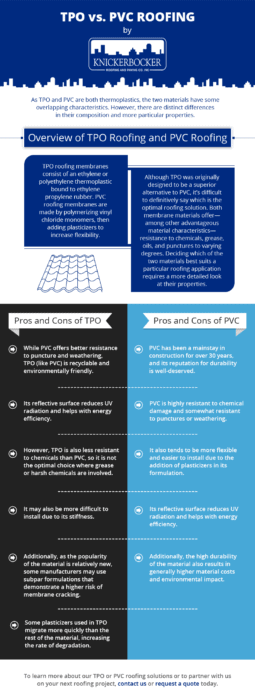TPO vs. PVC Roofing

The following blog post provides an overview of TPO and PVC roofing, discussing each material’s characteristics, pros, and cons and outlining general selection considerations.
TPO vs. PVC Roofing
As TPO and PVC are both thermoplastics, the two materials have some overlapping characteristics. However, there are distinct differences in their composition and more particular properties.
Overview of TPO Roofing and PVC Roofing
TPO roofing membranes consist of an ethylene or polyethylene thermoplastic bound to ethylene propylene rubber. PVC roofing membranes are made by polymerizing vinyl chloride monomers, then adding plasticizers to increase flexibility.
Although TPO was originally designed to be a superior alternative to PVC, it’s difficult to definitively say which is the optimal roofing solution. Both membrane materials offer—among other advantageous material characteristics—resistance to chemicals, grease, oils, and punctures to varying degrees. Deciding which of the two materials best suits a particular roofing application requires a more detailed look at their properties.
Pros and Cons of TPO
While PVC offers better resistance to puncture and weathering, TPO (like PVC) is recyclable and environmentally friendly. Its reflective surface reduces UV radiation and helps with energy efficiency.However, TPO is also less resistant to chemicals than PVC, so it is not the optimal choice where grease or harsh chemicals are involved. It may also be more difficult to install due to its stiffness. Additionally, as the popularity of the material is relatively new, some manufacturers may use subpar formulations that demonstrate a higher risk of membrane cracking.
Pros and Cons of PVC
PVC has been a mainstay in construction for over 30 years, and its reputation for durability is well-deserved. PVC is highly resistant to chemical damage and somewhat resistant to punctures or weathering. It also tends to be more flexible and easier to install due to the addition of plasticizers in its formulation.
However, the use of plasticizers does raise some concerns regarding weathering. Some plasticizers used in PVC break down more quickly than the rest of the material, increasing the rate of degradation. Additionally, the high durability of the material also results in generally higher material costs and environmental impact.
Considerations When Choosing TPO or PVC Roofing
The similarities between PVC and TPO make either material a likely option for most flat roofing projects. When deciding between the two materials, there are a few considerations that can help determine which is best suited for the project, such as:
Cost
TPO is cheaper than PVC per square foot of material. However, the amount of labor during installation is about equal for both materials, if not slightly more intensive for TPO.
Labor
PVC can be easier to install due to its greater flexibility. Additionally, some TPO installations may require more work if the contractor decides to use glued seams over welded seams.
Industry standards
Due to the relatively regular updates to ASTM standards for TPO, some manufacturers may not follow the most recent standards. The same risk is much lower for established materials, such as PVC. When using TPO in roofing systems, it’s essential to pick a reputable supplier.
Membrane quality
Regardless of whether the roofing project uses TPO or PVC, it’s important to vet and choose an experienced Some of the things to look for in a supplier are extensive industry experience, consistently high-quality and industry-compliant products, and a clear warranty policy.
Energy efficiency
TPO and PVC roofing membranes both provide naturally reflective surfaces that reduce UV radiation penetration and facilitate greater energy efficiency. By using smoother TPO and PVC membranes, the roofing system is also better protected from dirt and debris buildup, which can reduce the membrane’s reflective properties. All major manufacturers of TPO and PVC membranes comply to the most stringent of energy codes, including in Chicago.
Durability/Longevity
In theory, TPO roofs should be more durable because they lack plasticizers. However, many PVC roofs have withstood decades of wear without failure, so it’s less of a concern than some make it out to be.
Quality TPO and PVC Roofing Solutions From Knickerbocker
PVC and TPO are both suitable for use in industrial, commercial, or institutional roofing projects. However, when choosing between the two, it’s essential to understand the unique advantages and disadvantages of each material. Additionally, once you’ve made the decision, you should source from an experienced and reputable manufacturer to ensure you receive a high-quality product.
At Knickerbocker Roofing and Paving, we provide PVC and TPO roofing system installations, including green roof designs. Our team has the skills and experience necessary to install roofs ranging from 1,000 to 1,000,000 square feet. In addition to our installation services, we offer electronic field vector mapping (EFVM), routine maintenance, and emergency repair services to keep your roof in good health.
By partnering with us for your roofing needs, you benefit from our:
- Over 130 years of industry experience
- Experienced and friendly employees
- Furnishing and installation certifications from all major roofing system manufacturers
- Fully equipped sheet metal fabrication shop
- Free inspection and evaluation services
- Long-term manufacturers’ warranties
- Project financing options
To learn more about our TPO or PVC roofing solutions or to partner with us on your next roofing project, contact us or request a quote today.
